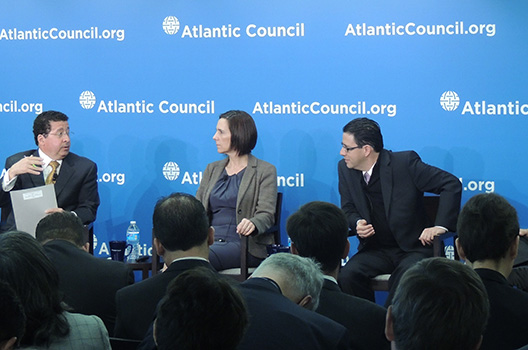 Mexico’s historic energy reforms continue to hold exciting promise for the country, achieving the requisite constitutional and implementing legislation over the last fifteen months. The global oil price climate, however, has prompted a few mid-course corrections to the rollout of the reforms. For Mexico to continue to attract excitement for its energy sector, the government will need to maintain a degree of flexibility while holding true to the principles of the reforms.
Mexico’s historic energy reforms continue to hold exciting promise for the country, achieving the requisite constitutional and implementing legislation over the last fifteen months. The global oil price climate, however, has prompted a few mid-course corrections to the rollout of the reforms. For Mexico to continue to attract excitement for its energy sector, the government will need to maintain a degree of flexibility while holding true to the principles of the reforms.
On April 7, the Adrienne Arsht Latin America Center, in partnership with the Global Energy Center, hosted an event, Mexico’s Energy Reform: Is It Still on Track? The discussion convened three of the top Mexican officials implementing the reforms: Dr. Lourdes Melgar, Deputy Secretary of Energy for Hydrocarbons within the Secretariat of Energy (SENER); Juan Carlos Zepeda, President Commissioner of the National Hydrocarbons Commission (CNH); and Salvador Ugalde, Head of the Hydrocarbon Income Unit within the Secretariat of Finance and Public Credit (Hacienda). David Goldwyn, Chair of the Atlantic Council’s Energy Advisory Group and the Adrienne Arsht Latin America Center’s Senior Nonresident Energy Fellow, moderated the discussion.
Latin America Center Director Peter Schechter opened the event by highlighting the progress that Mexico has made in the energy reforms so far. He stressed the opportunities for US engagement and North American energy integration that Mexico’s new laws will incubate. Schechter noted that there are challenges ahead, but the secondary legislation and the actions taken since August have charted a productive path to sustained, positive growth for Mexico’s energy markets.
The panelists began with a presentation detailing the reforms’ progress to date in implementing the reforms. With a comprehensive presentation, Melgar, Zepeda, and Ugalde offered a real-time update on the regulatory infrastructure, and explained how the regulations were enabling transparency. A central element to the presentation included the aspects of the bidding and contracting process that have evolved to accommodate the oil price climate and to keep investment interest high.
Goldwyn then moderated a substantive discussion of the progress and the present challenges to the implementation and what policymakers can expect in the road ahead. The three panelists dove into timely details on local content rules, investment interest, and the role of smaller enterprises in the new energy landscape. Inherent to the reforms is the ability of Mexico’s energy regulators to more closely align with processes in the United States, especially in the shared Gulf of Mexico. This information was particularly useful to those looking ahead to Round Two of the reforms, which will begin in the coming months.
